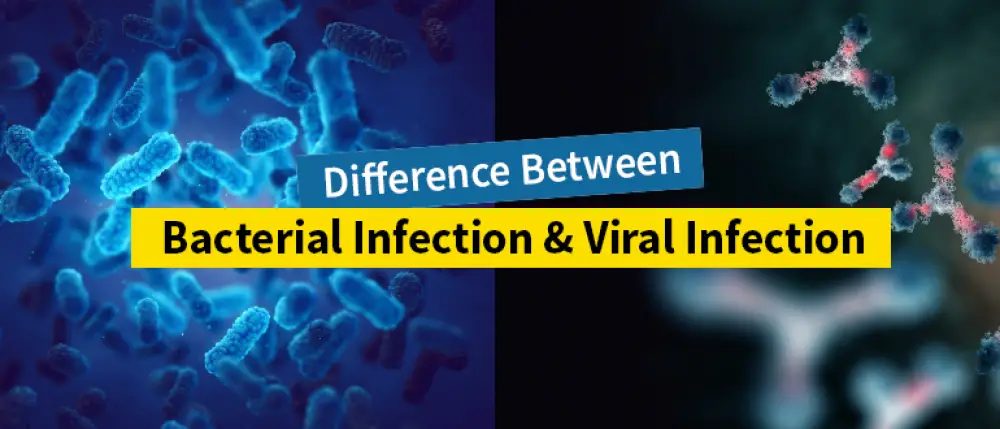Subscribe to get weekly insights
Always stay up to date with our newest articles sent direct to your inbox
Published on 17 Mar, 2023
Updated on 23 Mar, 2025
11994 Views
3 min Read

Written by Care Health Insurance
favorite1Like
Bacterial and viral fever are often mistaken for each other as they can cause similar symptoms and spread in the same way as each other. Bacteria and viruses are too tiny in size to see with bare eyes. However, knowing they are not similar in many ways and cause different health conditions is essential. Various bacteria and viruses lead to certain types of infections with varying levels of seriousness. Many bacterial and viral infections often need an antibiotic or antiviral therapy. And some infections can be cured with the help of vaccinations.
In this article, we have highlighted the primary difference between viral and bacterial fever, how these infections are transmitted, and what measures you can take to prevent them.
Bacteria are microscopic microorganisms made up of single cells. They are known to be diverse and can have many structural features and shapes. They live in and around the human body and in almost every environment. Not all bacteria cause infections; the ones that cause infection are called pathogenic bacteria. You are prone to fall sick from harmful bacteria that could attack your gastrointestinal tract, heart, brain, blood, lungs or elsewhere.
Viruses are different types of microscopic microorganisms, but they are tinier than bacteria. They also have different shapes and features, like bacteria, but they are parasitic. Being parasitic means they need tissue or living cells to grow on. They attack the cells of the human body, using the cells in the body to grow and multiply.
Bacterial infections are caused by living, single-celled organisms capable of reproducing independently. There are not many forms of bacteria that make people ill. At the same time, viral infections are caused by non-cellular organisms. Viruses always need to prey on humans or other living objects to multiply.
Bacterial and viral infections may have common causes but the severity differs. Below mentioned are the common causes of bacterial and viral infections-
Doctors usually prescribe antibiotics to treat bacterial infections as these medications stop bacteria from spreading or destroying them. Although many bacterial infections don't need antibiotics, sometimes your immune system fights the infection on its own.
Many doctors recommend waiting and sometimes watching to avoid antibiotics. It has been found that antibiotics have started losing their effectiveness against some bacteria. Antibiotics have been overused over the years as various types of bacteria have begun to adapt by mutating making antibiotics less effective. This condition is known as antibiotic resistance or antimicrobial resistance.
You will be prescribed medications for not all viral infections as a few viruses don't cause life-threatening or chronic illnesses. However, your doctor may recommend antiviral medications or treatment that saves you from falling sick after you get exposed to a virus.
Some infections don't cause severe illness, like the common cold. Such infections can be easily treated with home remedies until they go away independently.
>> Also Read: Dos and Don'ts of Viral Fever: Prevention, Symptoms & Treatment
Below mentioned preventive measures can reduce the risk of bacterial and viral infections-
Although you will probably feel better sooner, you must take antibiotics for a week or two if you have a bacterial infection. If you don't take all your medication exactly as directed, you might not feel completely healthy.
The duration of viral infections may vary according to the severity-
Yes, your health insurance plan covers bacterial and viral infections. You may not be able to avoid getting infected but you can definitely secure your savings if you have comprehensive health insurance by Care Health Insurance in place. However, you can follow the above mentioned preventive measures to be safe. If you fall prey to either of these infections and need to be hospitalised, make sure you have your health insurance to your rescue. This will enable you to recover better while you are hospitalised.
Disclaimer: Please verify the policy details and coverage with the official policy documents. Also, kindly consult a professional medical expert to verify the details of health concerns.
Thyroid : मामूली नहीं हैं महिलाओं में थायराइड होना, जानें इसके लक्षण और घरेलू उपचार Vipul Tiwary in Diseases
शुगर कंट्रोल कैसे करे? जानें, डायबिटीज में क्या खाना चाहिए Vipul Tiwary in Health & Wellness
हाई ब्लड प्रेशर को तुरंत कंट्रोल कैसे करें? देखें इसके उपाय Vipul Tiwary in Diseases
पैरों में दर्द किस कमी से होता है? जानें, इसके घरेलू इलाज Vipul Tiwary in Health Insurance Articles
Neglecting Oral Health and Hygiene? Your Brain Could Suffer the Consequences Jagriti Chakraborty in Mental Health
Unlock Your Health: Protein Powder for Women and Key Supplements Jagriti Chakraborty in Diet & Nutrition
Forget Yoghurt: 8 Probiotic Foods That Actually Work Jagriti Chakraborty in Health & Wellness
BIG Update: Nipah Virus Is Back, Here’s How to Stay Safe! Sejal Singhania in Health Insurance Articles
Always stay up to date with our newest articles sent direct to your inbox
Loading...